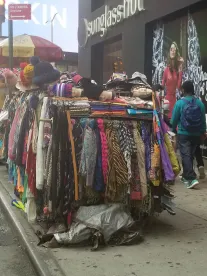The New York Fashion Sustainability and Social Accountability Act (A8352/S7428), if passed, will be the first US law to explicitly place sustainability requirements aimed at large fashion companies. These requirements would apply to fashion retailers and manufacturers that:
-
do business in New York; and
-
have global revenues in excess of $100 million USD.
New Obligations Under the Proposed Act
Companies subject to the proposed Act would be required to disclose their environmental and social due diligence policies, processes, and outcomes. Four disclosures are particularly notable.
Supply Chain Mapping. Companies would be required to use good faith efforts to map at least 50% of their supply chains, focusing on suppliers with higher social and environmental risks.
Social and Environmental Sustainability Report. Companies would be required to publish reports describing what they did to identify, prevent, and account for potential adverse impacts. These reports would need to include the below information in alignment with various global principles (including the UN Guiding Principles on Business and Human Rights, ILO Declaration on Fundamental Principles and Rights At Work, OECD Guidelines for Multinational Enterprises, and OECD Due Diligence Guidance for Responsible Business Conduct).
The reports would also need to include:
-
Links to relevant policies on responsible business conduct;
-
Information on measures taken to embed responsible business conduct into company policies and management systems;
-
Identified areas of risk in the company’s global supply chain;
-
Criteria for how risks are being prioritized;
-
Actions taken to prevent/mitigate risks (citing corrective action plans, where available);
-
Measures to track implementation and results; and
-
The company’s remediation efforts, if any.
Impact Disclosure on Prioritized Adverse Environmental & Social Impacts. Companies would have to make an impact disclosure within 18 months of the Act’s enactment. The impact disclosure would have to include:
-
Quantitative baseline and reduction targets on energy and greenhouse gas emissions;
-
Annual volume of materials produced, including breakdown by material type;
-
Median wages of workers of prioritized suppliers and how this compares with local minimum wages/living wages; and
-
The company’s approach for incentivizing supplier performance with respect to workers’ rights.
Targets Company Has for Impact Reductions. Companies would also be required to provide estimated timelines and benchmarks for improvement in covered areas such as climate change.
Enforcement
Failure to comply with the potential Act, if enacted, could result in penalties brought by the NY Attorney General (AG). These could include injunctions, monetary damages, and/or civil performance of a statutory duty. The current proposal would provide companies a 3 month period to remedy issues identified by the AG. Failure to remedy would result in a fine of up to 2% of annual revenues. The AG would also publish an annual report identifying companies found not to be in compliance with the Act.
Additionally, the current draft of the bill provides a private right of action by any citizen against any person alleged to have violated the Act or related AG orders. It would also allow any citizen to compel the AG to investigate a company’s compliance with the Act.
Current Status & Next Steps
The bill was initially introduced in October of 2021, and is now pending in the Consumer Protection committee. A vote is expected later this spring. Should it pass, fashion retailers and manufacturers should consult with counsel regarding strategies to publish the covered disclosures.





 />i
/>i

